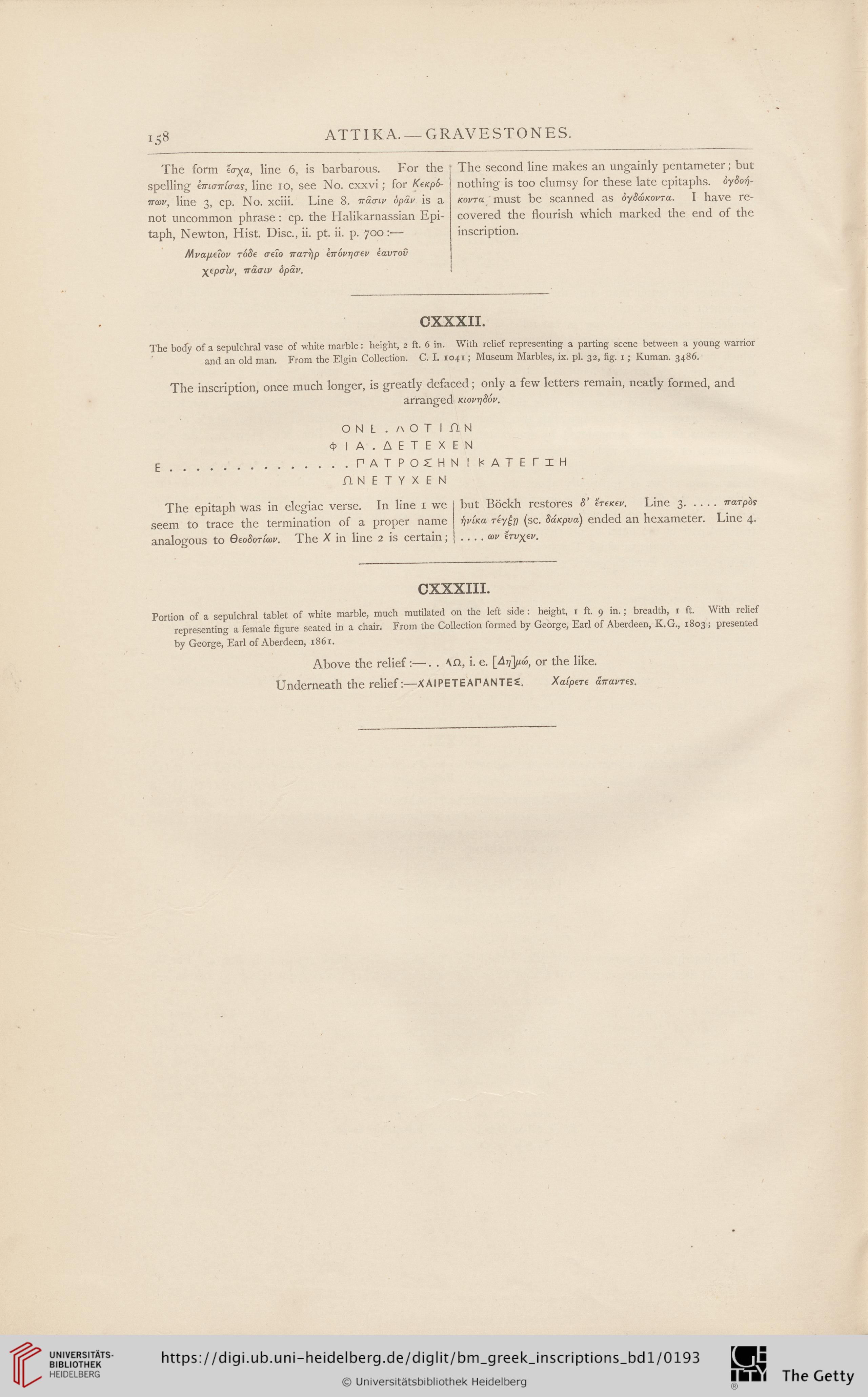!58
ΑΤΤΙΚΑ. —GRAVESTONES.
The form «σ-χα, line 6, is barbarous. For the
spelling όησπίσαί, line io, see No. cxxvi; for Κεκρό-
Ίτα>ν, line 3, cp. No. xciii. Line 8. πάσιν όράν is a
not uncommon phrase: cp. the Halikarnassian Epi-
taph, Newton, Hist. Disc., ii. pt. ii. p. 700 :·—
/Λναμεΐον τάδε σεΐο πατήρ έπόνησεν έαυτοΰ
χερσιν, πάσεν όράν.
The second line makes an ungainly pentameter; but
nothing is too clumsy for these late epitaphs. ό-γδοή-
κοντα must be scanned as όγδώκοντα. I have re-
covered the flourish which marked the end of the
inscription.
CXXXII.
The body of a sepulchral vase of white marble: height, 2 ft. 6 in. With relief representing a parting scene between a young warrior
and an old man. From the Elgin Collection. C. I. 1041; Museum Marbles, ix. pl. 32, fig. 1 · Kuman. 3486.
The inscription, once much longer, is greatly defaced; only a few letters remain, neatly formed, and
arran
ged κιονηδόν.
O
N
L
/\
O T
1 A N
Φ 1
A
•
Δ
E
T E
X E N
E.
Γ
A
T
P
O Z
Η N ! k AT E Γ I H
A
N
E
T
Y
X E
N
The epitaph was in elegiac verse. In line 1 we
seem to trace the termination of a proper name
analogous to θεοδοτίων. The X in line 2 is certain;
but Bockh restores 8’ ετεκεν. Line 3 πατρός
ηνίκα τεγ^ρ (sc. δάκρυα) ended an hexameter. Line 4.
. ... ων ίτυγζν.
CXXXIII.
Portion of a sepulchral tablet of white marble, much mutilated on the left side : height, 1 ft. 9 in.; breadth, 1 ft. With relief
representing a female figure seated in a chair. From the Collection formed by George, Earl of Aberdeen, K.G., 1803; presented
by George, Earl of Aberdeen, 1861.
Above the relief:—. . \n, i. e. [Δη]μώ, or the like.
Underneath the relief:—X Al PETE ΑΠ ANTES. Χαίρετε άπαντες.
ΑΤΤΙΚΑ. —GRAVESTONES.
The form «σ-χα, line 6, is barbarous. For the
spelling όησπίσαί, line io, see No. cxxvi; for Κεκρό-
Ίτα>ν, line 3, cp. No. xciii. Line 8. πάσιν όράν is a
not uncommon phrase: cp. the Halikarnassian Epi-
taph, Newton, Hist. Disc., ii. pt. ii. p. 700 :·—
/Λναμεΐον τάδε σεΐο πατήρ έπόνησεν έαυτοΰ
χερσιν, πάσεν όράν.
The second line makes an ungainly pentameter; but
nothing is too clumsy for these late epitaphs. ό-γδοή-
κοντα must be scanned as όγδώκοντα. I have re-
covered the flourish which marked the end of the
inscription.
CXXXII.
The body of a sepulchral vase of white marble: height, 2 ft. 6 in. With relief representing a parting scene between a young warrior
and an old man. From the Elgin Collection. C. I. 1041; Museum Marbles, ix. pl. 32, fig. 1 · Kuman. 3486.
The inscription, once much longer, is greatly defaced; only a few letters remain, neatly formed, and
arran
ged κιονηδόν.
O
N
L
/\
O T
1 A N
Φ 1
A
•
Δ
E
T E
X E N
E.
Γ
A
T
P
O Z
Η N ! k AT E Γ I H
A
N
E
T
Y
X E
N
The epitaph was in elegiac verse. In line 1 we
seem to trace the termination of a proper name
analogous to θεοδοτίων. The X in line 2 is certain;
but Bockh restores 8’ ετεκεν. Line 3 πατρός
ηνίκα τεγ^ρ (sc. δάκρυα) ended an hexameter. Line 4.
. ... ων ίτυγζν.
CXXXIII.
Portion of a sepulchral tablet of white marble, much mutilated on the left side : height, 1 ft. 9 in.; breadth, 1 ft. With relief
representing a female figure seated in a chair. From the Collection formed by George, Earl of Aberdeen, K.G., 1803; presented
by George, Earl of Aberdeen, 1861.
Above the relief:—. . \n, i. e. [Δη]μώ, or the like.
Underneath the relief:—X Al PETE ΑΠ ANTES. Χαίρετε άπαντες.




